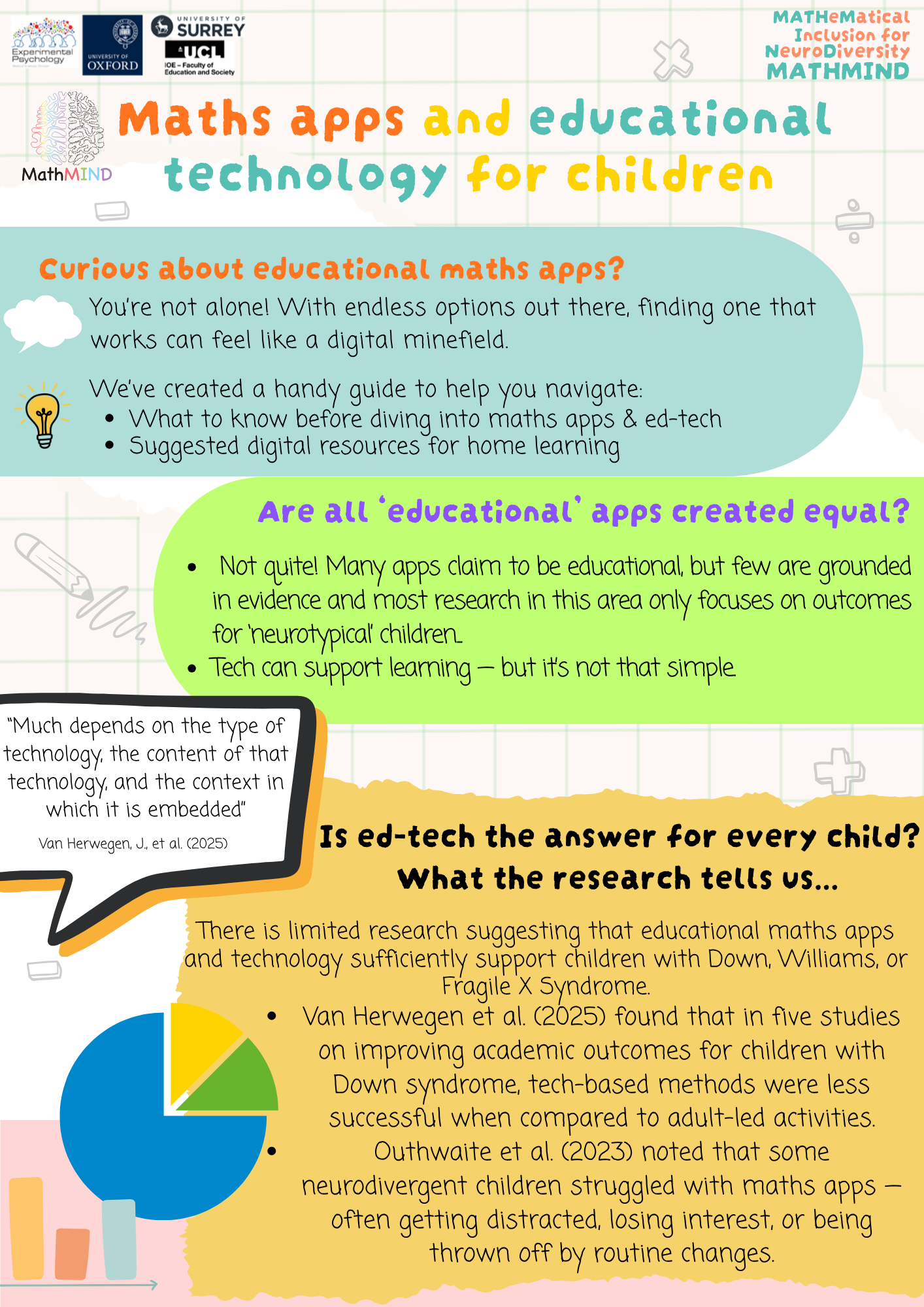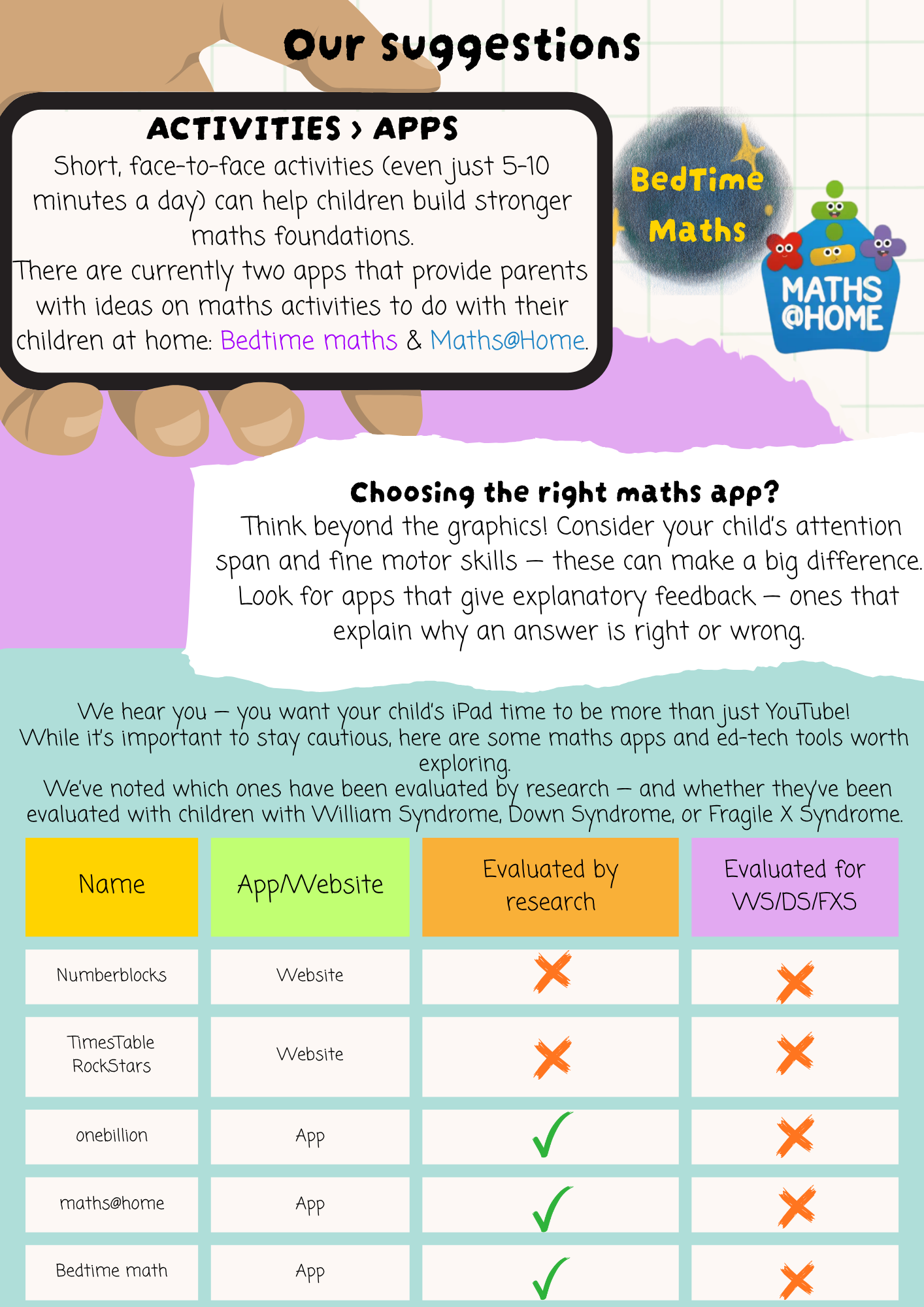3. MathMIND - Mathematical Inclusion and Neurodiversity
How can Neurodivergent children be included in mathematical learning?
Summary
Researchers at the University of Oxford, the University of Surrey, and University College London are aiming to find out what thinking skills and educational supports help children with Down Syndrome, Fragile X Syndrome and Williams Syndrome in relation to mathematics.
WhAT ARE OUR AIMS?
The aims of this project are to better understand:
1) the thinking skills that contribute to strong numeracy for children with these genetic syndromes across primary school, and
2) the school environments that best support their numeracy.
Who are we?
RESEARCH Team
The programme will be delivered by teams from the University of Oxford, the University of Surrey and UCL. The lead investigators are Gaia Scerif (Oxford), Emily K Farran (Surrey) and Jo Van Herwegen (UCL) At Oxford, the team is made up of Postdoctoral Researcher Jennifer Bullen. In Surrey, the team includes Katie-Anne Costello and at UCL, Zahra Siddiqui.
The research team are responsible for recruiting participants, carrying out the research and analysis, identifying and sharing findings.
Oxford team: Gaia Scerif, Jennie Bullen, & Sophie Smith


Emily Farran and Katie-anne Costello

Jo Van Herwegen and Zahra siddiqui


fundER
This project is funded by the Economic and Social Research Council (ESRC), which is part of UK Research and Innovation (UKRI).
ADVISORY GROUP
The research is supported by an advisory group.
FAQs
Question: Are there any maths games or apps that could support my child with their learning?
Response: Here is an infographic that the MathMIND team have created on educational technology and maths apps which parents and caregivers may find helpful.


Plain Text Version
Maths apps and educational technology for children
Curious about educational maths apps?
You’re not alone! With endless options out there, finding one that works can feel like a digital minefield.
We’ve created a handy guide to help you navigate:
- What to know before diving into maths apps & ed-tech
- Suggested digital resources for home learning
Are all ‘educational’ apps created equal?
- Not quite! Many apps claim to be educational, but few are grounded in evidence and most research in this area only focuses on outcomes for ‘neurotypical’ children...
- Tech can support learning — but it’s not that simple.
“Much depends on the type of technology, the content of that technology, and the context in which it is embedded” - Van Herwegen, J., et al. (2025)
Is ed-tech the answer for every child? What the research tells us...
There is limited research suggesting that educational maths apps and technology sufficiently support children with Down, Williams, or Fragile X Syndrome.
- Van Herwegen et al. (2025) found that in five studies on improving academic outcomes for children with Down syndrome, tech-based methods were less successful when compared to adult-led activities.
- Outhwaite et al. (2023) noted that some neurodivergent children struggled with maths apps — often getting distracted, losing interest, or being thrown off by routine changes.
Our suggestions
Activities > apps
Short, face-to-face activities (even just 5–10 minutes a day) can help children build stronger maths foundations.
There are currently two apps that provide parents with ideas on maths activities to do with their children at home: Bedtime maths & Maths@Home.
Choosing the right maths app?
Think beyond the graphics! Consider your child’s attention span and fine motor skills — these can make a big difference.
Look for apps that give explanatory feedback — ones that explain why an answer is right or wrong.
We hear you — you want your child’s iPad time to be more than just YouTube!
While it’s important to stay cautious, here are some maths apps and ed-tech tools worth exploring.
We’ve noted which ones have been evaluated by research — and whether they’ve been evaluated with children with William Syndrome, Down Syndrome, or Fragile X Syndrome.
|
Name |
App/Website |
Evaluated by research |
Evaluated for William Syndrome/Down Syndrome/Fragile X Syndrome |
|
Numberblocks |
Website |
No |
No |
|
TimesTable RockStars |
Website |
No |
No |
|
onebillion |
App |
Yes |
No |
|
maths@home |
App |
Yes |
No |
|
Bedtime math |
App |
Yes |
No |
Read the references here:
Van Herwegen et al. (2025): https://www.nuffieldfoundation.org/project/raising-educational-outcomes-for-pupils-with-sen-and-disabilities
Outhwaite et al. (2023): https://www.nuffieldfoundation.org/project/can-maths-apps-add-value-to-learning
Contact us
If you have any questions about the programme, please get in contact with us at MathMIND@psy.ox.ac.uk.


